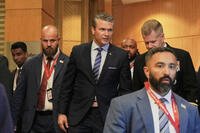Rep. Rob Wittman, R-Virginia, is the ranking member of the Seapower and Projection Subcommittee of the House Armed Services Committee. He also serves on the HASC Tactical Air and Land Subcommittee.
You often hear about "military readiness" and our nation's ability to rapidly respond and address major global conflicts, but military readiness extends well beyond the battlefield.
This is especially true in the home -- where the conflicts aren't global but the impacts on readiness are no less important. When a service member and their spouse agree to sign up and make the familial and personal sacrifices it takes to serve our nation, they mostly understand what they are facing.
Yet there is one major caveat: a military spouse's frustratingly difficult time building a career.
Military spouses are an underutilized economic resource. Most of them are ready, properly trained and willing to join the workforce. But they experience unique barriers that come along with being a military spouse that many times put them at a disadvantage in gaining employment.
While the operational needs that cause a hectic military family life will not be changing anytime soon, we must change the way we address military spouse employment. We can achieve this by utilizing advances in connective technology, resource networks, nonprofits, and by finding avenues to leverage reciprocity in occupational licensing if we are to actualize military spouse potential and help them find meaningful employment.
Virginia is proud to be home to one of the nation's largest populations of military families. The constant relocation of family units is the leading challenge to military spouses building their careers. As technology has advanced to increase global connectivity, we have seen several Fortune 500 companies begin to offer remote work opportunities that allow for service spouses to work from their homes and continue their careers wherever they are stationed.
However, while this is great for lucrative companies that can afford the digital infrastructure necessary to offer remote work, Congress and the Defense Department should look to establish public-private partnerships and subsidies that incentivize companies that are willing to offer remote work, but cannot fund the foundational pieces necessary to make it a reality.
On top of this, many spouses have all the requisite skills to continue practicing their occupation, but frequent moves across state lines cause licensing issues that make it nearly impossible. The Department of Homeland Security and the DoD have been making inroads with multiple state legislatures to establish occupational licensing reciprocity. But, with 50 different state legislatures in play, this is a project with no foreseeable end in sight.
And, while states are understandably protective of their ability to govern whom they deem appropriate to practice within their boundaries, Congress should begin to take a serious look at occupational licensing reciprocation on military bases and federally owned land -- allowing a licensed military spouse to continue practicing in their chosen field regardless of the state they are temporarily located in. This may be an appropriate workaround to the occupational licensure troubles that have plagued military spouses for decades.
Unfortunately, a lack of portable jobs isn't the only hurdle for a military spouse. A deficit in available child care presents itself as a serious problem for the aspiring working partner. This problem is further compounded by lengthy deployments, forcing spouses who may have been working on their career to sideline it in favor of familial obligations. To combat this, Congress needs to work with the DoD and the appropriate federal entities to establish reliable, quality on-base child care facilities. All efforts to facilitate career paths that can co-exist alongside a service member are largely wasted if we fail to remedy the child care issues imposed by lengthy service-mandated family separations.
Congress, the DoD and nonprofits have come a long way in enabling career possibilities for military spouses. For example, the annual national defense legislation that Congress passed last year -- the National Defense Authorization Act -- included provisions to expand hiring opportunities, support military spouse-owned small businesses, and concentrate efforts on easing the issues associated with constant relocation. It was terrific that this piece of legislation took steps to address some of the constant challenges associated with the military family experience, but there is still so much more that needs to be done.
And while, realistically, these issues will not be solved in any single year, we must continue to strive to make inroads where we find them and continue to take advantage of emerging technologies that allow our military spouses to build the careers that they deserve.
-- The opinions expressed in this op-ed are those of the author and do not necessarily reflect the views of Military.com. If you would like to submit your own commentary, please send your article to opinions@military.com for consideration.















